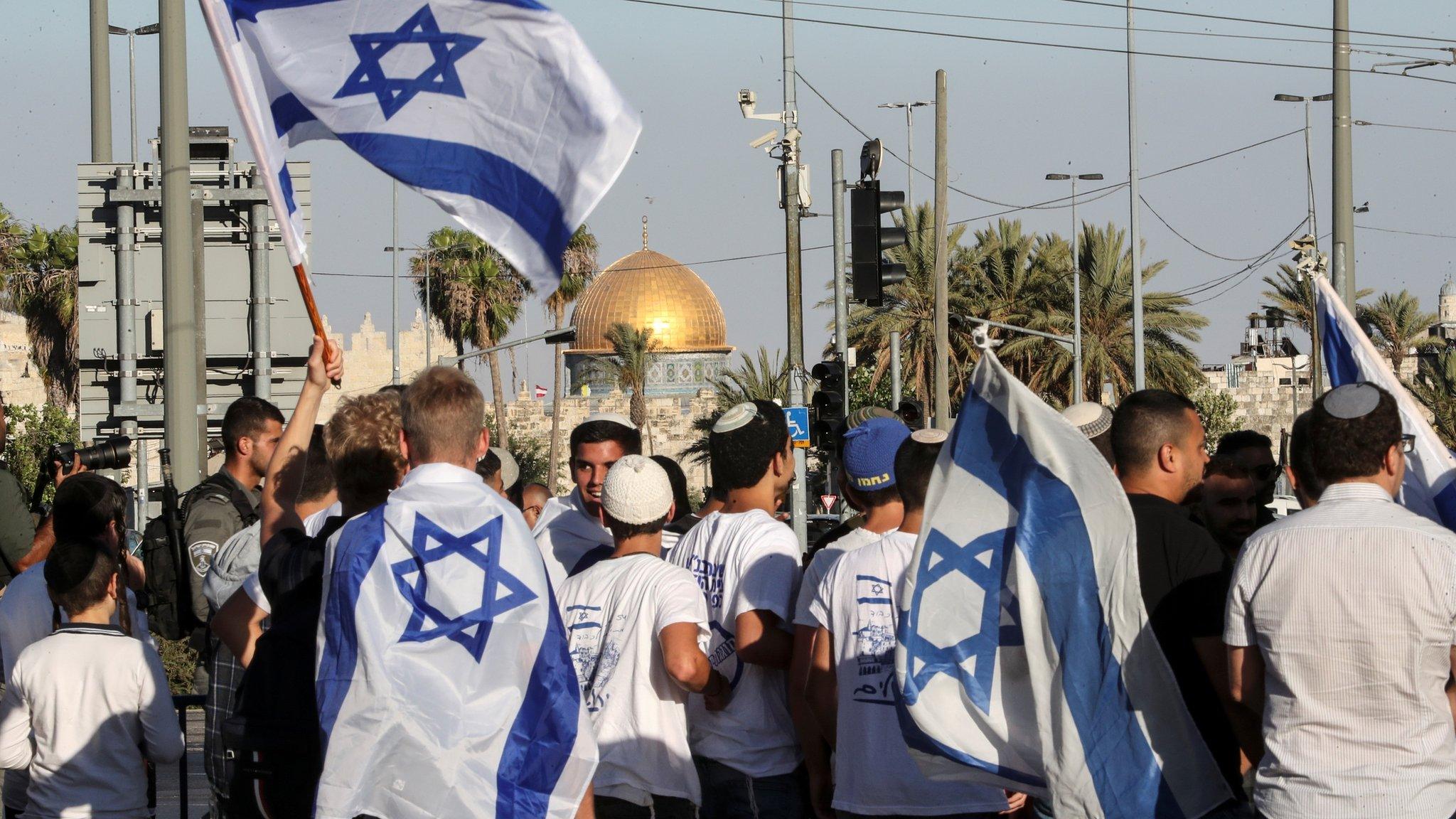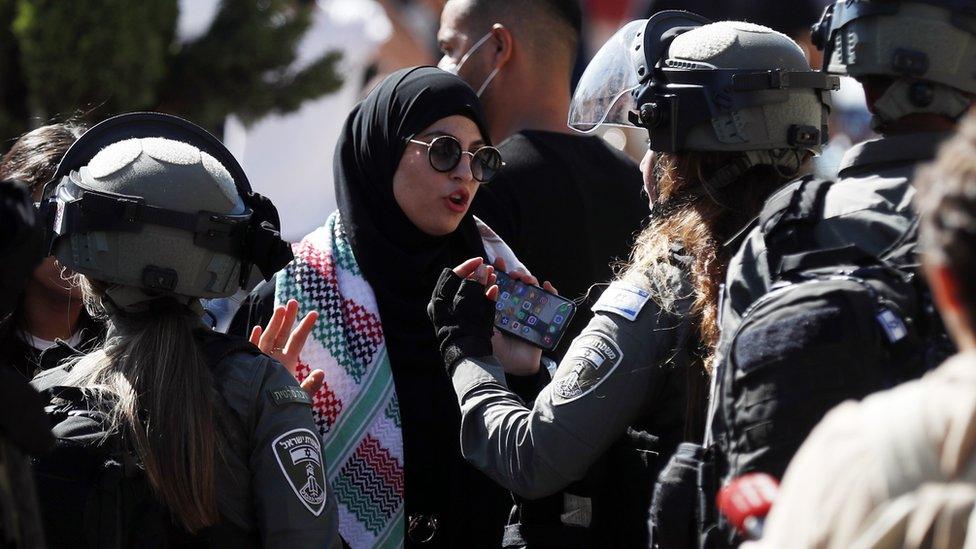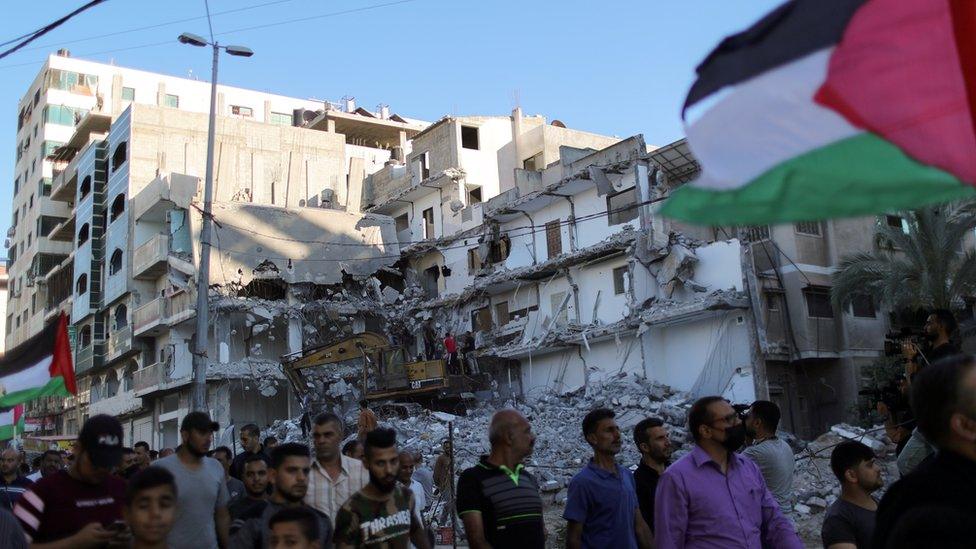Israeli nationalists march through Jerusalem's Old City
- Published

Organisers of the event insisted that participants had a right to march through Jerusalem
Hundreds of Israeli nationalists have taken part in a flag march through occupied East Jerusalem which Palestinians saw as a provocation.
The new Israeli government approved changes to the route of the delayed annual event, which marks Israel's capture of East Jerusalem in 1967.
Palestinian protesters clashed with Israeli police nearby before it began.
The Palestinian prime minister warned of "dangerous repercussions", only weeks after the conflict in Gaza ended.
At least 33 Palestinians were injured in clashes in East Jerusalem, medics said, but the violence was not as extensive as initially feared.
Another 17 were arrested in clashes with police.
As the result of the recent conflict between Israelis and Palestinians, at least 256 people were killed in Gaza and 13 people were killed in Israel during 11 days of fierce fighting between Israel and Palestinian militants.
The violence came after weeks of spiralling Israeli-Palestinian tension which culminated on 10 May in clashes at a holy site in the Old City that is revered by both Muslims and Jews.
The march was originally due to take place on that day, but was rerouted by Israeli authorities at the last minute and then cancelled.
The militant group Hamas, which controls Gaza, then began firing rockets into Israel after warning it to withdraw from the holy site, triggering retaliatory air strikes from Israel on targets in Gaza.

Israeli police cleared streets around the route of the march earlier on Tuesday
The Jerusalem Day flag march is an annual event that marks Israel's capture of East Jerusalem - home to the Old City and its holy sites - in the 1967 Middle East War.
Flag-waving Israeli youths usually make their way through the Old City's Muslim Quarter via the Damascus Gate, chanting and singing patriotic songs.
The rescheduled march had been due to take place last Thursday, but organisers cancelled it after Israeli police rejected the proposed route, citing security concerns.
The government of former Israeli Prime Minister Benjamin Netanyahu later said the march could go ahead this week if a format could be agreed by police and organisers. Mr Netanyahu was replaced on Sunday after 12 years in power.
That left the final decision to the new administration of Naftali Bennett, a right-wing nationalist who heads a coalition of eight parties spanning the entire spectrum of Israeli politics.
"We hope it's the beginning of a new Israel": Many Israelis celebrate the new coalition government
On Monday, Public Security Minister Omer Bar-Lev confirmed that the march could proceed after he met Israel's police chief and other security officials.
"The right to demonstrate is a right in all democracies," he said. "A great effort is being made to preserve the delicate fabric of life and public security."
However, the leader of the Arab Islamist Raam party that is part of the new coalition said on Tuesday that the march should have been cancelled. Mansour Abbas warned it was "an attempt to ignite the region for political purposes".
Eytan Meir, a spokesman for one of the groups organising the event, told the BBC that it was a matter of free speech.
"The bottom line is that if we worried about what people thought... [then] we should just pack up our bags and leave, because most people in our region don't really want the Jewish state to be there. But we believe we have a right to be here, that we have a right to march with our flags in Jerusalem."
Centrist Yair Lapid - Israel's foreign minister and main partner in the governing coalition - condemned the march.
On Twitter, he said, external: "It's inconceivable how you can hold an Israeli flag and shout 'Death to Arabs' at the same time... These people are a disgrace to the nation of Israel."


Israeli media said participants would gather outside the Damascus Gate before entering the Old City through the Jaffa Gate and then walking towards the Western Wall, one of Judaism's holiest sites.
The Western Wall is part of the retaining wall of a hilltop complex known to Jews as the Temple Mount and to Muslims as al-Haram al-Sharif (the Noble Sanctuary). The complex contains the al-Aqsa Mosque, the third holiest site in Islam, and the Dome of the Rock.
"We warn of the dangerous repercussions that may result from the occupying power's intention to allow extremist Israeli settlers to carry out the Flag March in occupied Jerusalem," Palestinian Authority Prime Minister Mohammed Shtayyeh tweeted on Monday.

Palestinians in northern Gaza protested against the Jerusalem flag march on Tuesday
Hamas spokesman Abdullatif Qanou urged Palestinians to "halt the march" and said it would be a "fuse for a new explosion for the protection of the al-Aqsa Mosque and Jerusalem".
Israeli media reported that the Israeli military was on heightened alert, and that Iron Dome missile defence batteries had been deployed to counter possible Palestinian rocket fire.
Before the march started, incendiary balloons launched from Gaza caused at least 20 fires in fields in southern Israel, Israel's fire service said.